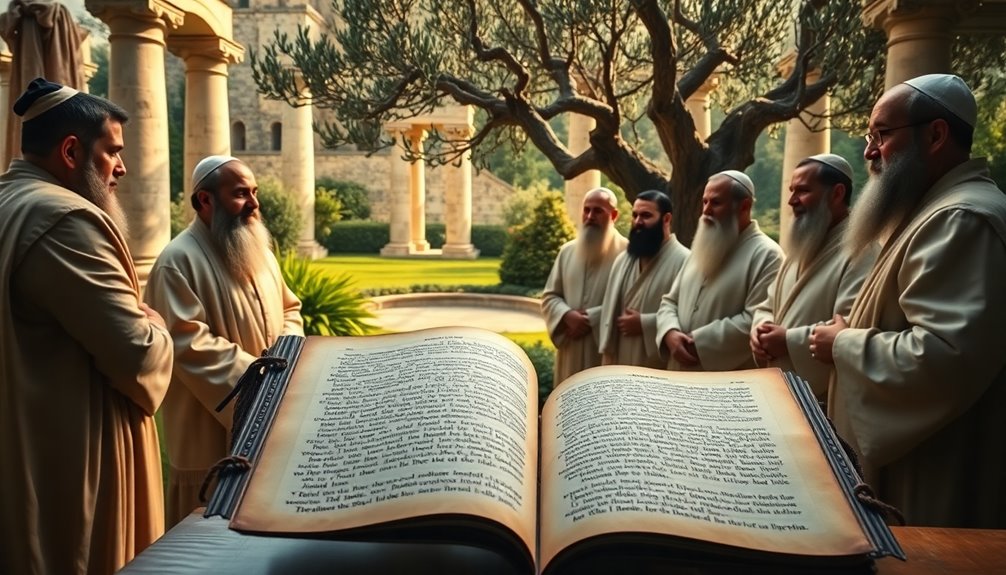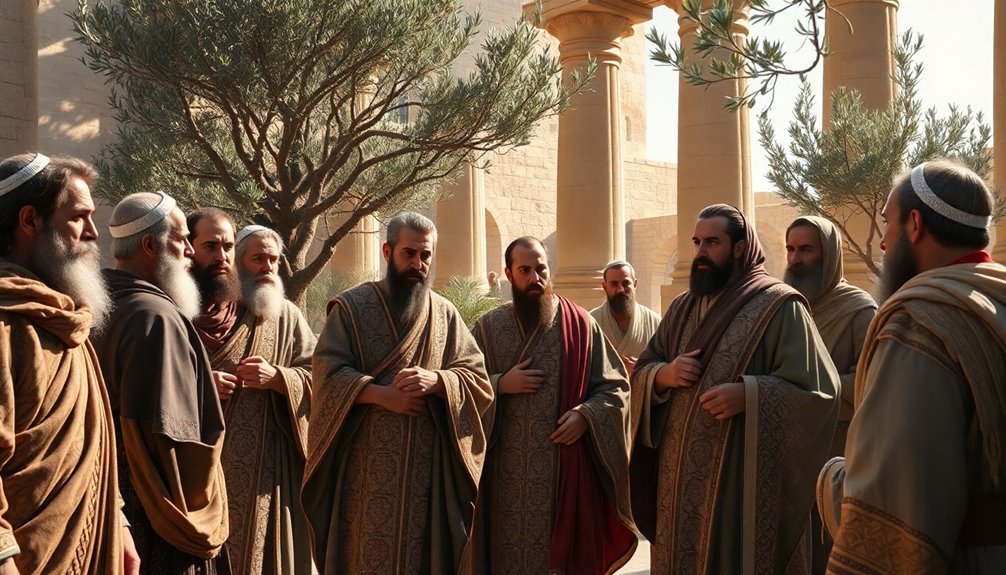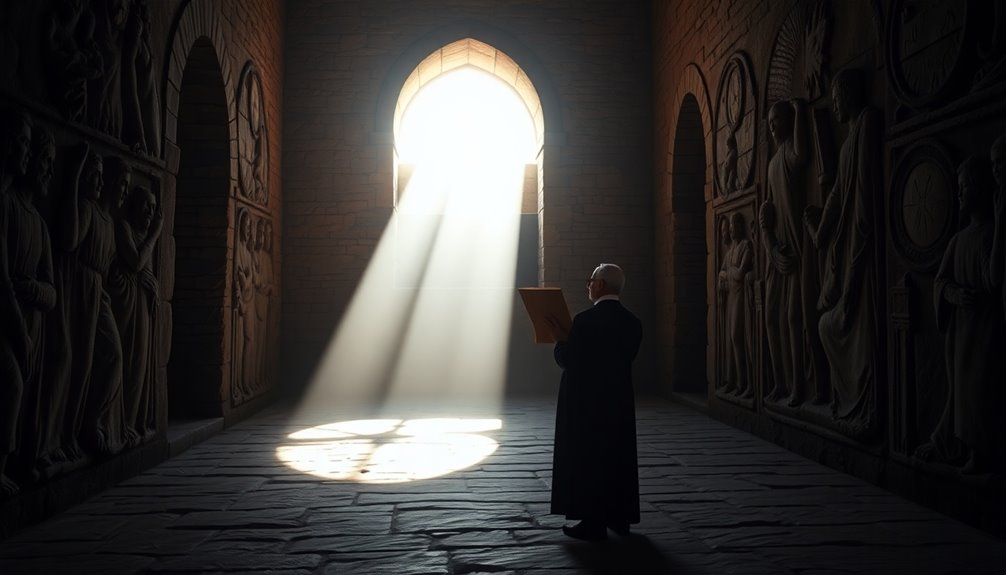In the Bible, Pharisees were a key group of Jewish leaders during the Second Temple period. They emphasized strict observance of the Mosaic Law and the Oral Law, believing that following these rules was essential for righteousness. While they sought to maintain Jewish practices amidst outside influences, Jesus often criticized them for their hypocrisy and legalism. Some Pharisees, like Nicodemus, showed a more open attitude towards Jesus' teachings. Their influence shaped not only Jewish identity but also the early Christian landscape. If you're curious about their teachings and interactions further, there's plenty more to explore.
Key Takeaways
- Pharisees were a Jewish sect during the Second Temple period, emerging around 150 BCE, emphasizing strict adherence to the Mosaic Law and oral traditions.
- They played a significant role in shaping Jewish identity and were known for their legalistic interpretations and focus on ritual purity.
- The Pharisees believed in the resurrection and free will, distinguishing their beliefs from the Sadducees, who denied these concepts.
- Jesus often criticized Pharisees for hypocrisy, emphasizing the need for internal transformation over mere legal compliance.
- Their teachings and interpretations significantly influenced the development of rabbinic Judaism and early Christian thought.
Introduction

When you think of the Pharisees in the Bible, it's easy to picture them as strict legalists, often at odds with Jesús. However, they were more than just opponents; they played a crucial role in el judaísmo during the periodo del Segundo Templo.
Emerging around 150 a.C., los fariseos aimed to make the piedad and purity of the sacerdotes accessible to all Jews, thus emphasizing the importance of both the ley escrita and an evolving tradición oral.
The fariseos were known for their rigorous adherence to the law and rituals, resisting the influence of helenismo on their culture.
In the Nuevo Testamento, they frequently appear in conflict with Jesús, who called them out for their hipocresía and the tendency to prioritize legalism over verdadera justicia and misericordia.
Yet, it's vital to note that not all fariseos opposed Jesús; some, like Nicodemo, sought to understand his teachings and engaged with his message.
Understanding the complexity of los fariseos enriches your perspective on the cultural and religious dynamics of the time, revealing a group deeply invested in their faith and community.
Pharisaic Teachings on Righteousness

When you explore Pharisaic teachings on righteousness, you'll find a strong emphasis on strict adherence to both the written law and oral traditions.
Key Bible references illustrate how the Pharisees defined righteousness through meticulous observance of laws and personal piety.
Understanding these teachings will shed light on their views and the criticisms they faced, especially from Jesus.
Primary Bible References
In the context of biblical teachings, the Pharisees held a distinct view of righteousness rooted in strict adherence to the Mosaic Law and their extensive oral traditions. They interpreted la ley to encompass over 600 laws, governing la vida cotidiana and emphasizing external compliance over internal transformation.
The fariseos focused heavily on meticulous tithing and rituals, as illustrated in Luke 18:12, where a Pharisee boasts about his practices, showcasing their commitment to la tradición.
However, Jesus criticized the Pharisees for la hipocresía in Matthew 23:27-28, describing them as "whitewashed tombs." This metaphor highlights the disconnect between their outward actions and true justicia, suggesting that mere compliance isn't enough for true righteousness in the eyes of Dios.
In fact, Matthew 5:20 warns that unless one's righteousness exceeds that of the Pharisees, entering the Kingdom of Heaven is impossible.
The teachings of the Pharisees also touched on la resurrección de los muertos, reflecting their complex beliefs surrounding life after death.
Ultimately, their approach to cumplimiento demonstrated a legalistic mindset that Jesus sought to challenge, calling for a deeper, more authentic relationship with God.
Secondary Bible References
Pharisaic teachings on righteousness emphasize that strict adherence to the Law and oral traditions is essential for achieving a right standing with God. The fariseos believed that both external compliance and internal piety were crucial in their pursuit of justicia.
In their práctica del judaísmo, they focused on maintaining ritual pureza and observing numerous tradiciones, which they viewed as necessary for a holy vida cotidiana.
Their teachings highlighted the importance of moral conduct, as they held a firm belief in resurrección and the idea of individual rewards and punishments in the afterlife. This made living righteously a central focus in their lives.
Tithing and other forms of giving were emphasized as vital practices, reinforcing the necessity of dedicating resources to God.
However, some fariseos, like Nicodemus, recognized that strict legalism could limit a deeper understanding of righteousness. They sought to balance their teachings with a faith-based approach, acknowledging that true justicia transcends mere adherence to the ley.
This blend of tradition and faith showcases the complexity of Pharisaic thought and its lasting impact on understanding righteousness in a spiritual context.
Second Temple Judaism Dynamics

The dynamics of Second Temple Judaism were shaped by various religious factions, with the Pharisees emerging as a dominant force. You'll notice that the fariseos emphasized both the ley escrita and the ley oral, which allowed them to maintain Jewish identity amid Hellenistic influences. Their focus on personal piety and pureza ritual distinguished them from groups like the saduceos, who'd contrasting theological views.
Conflicto between the Pharisees and Sadducees intensified during the Hasmonean kings' reign, creating significant social and religious strife within Judean society. This rivalry highlighted the Pharisees' commitment to the interpretation de la Torá, as they sought to navigate the complexities of their faith in a rapidly changing world.
After the destruction of the Segundo Templo in 70 CE, the Pharisees played a crucial role in the development of judaísmo rabínico. Their teachings laid the groundwork for the eventual compilation of the Mishnah, shifting Jewish practice away from temple sacrifices towards community-centered worship and education in synagogues.
Thus, the Pharisees significantly influenced Jewish thought and identity during this pivotal period.
Pharisees' Role in Oral Law

After establishing their dominance in Second Temple Judaism, the Pharisees played a pivotal role in shaping the understanding of the Oral Law. They believed that alongside the written Torá, Moses transmitted an Oral Law (Torah she-be-al peh) that provided vital interpretaciones and enseñanzas for everyday vida cotidiana.
This ley oral was essential for grasping the nuances of the written law, allowing flexibility and adaptation to contemporary circumstances while prioritizing life over strict legalism.
The fariseos developed a comprehensive system of legal interpretations that later formed the foundation for judaísmo rabínico. Their emphasis on the Oral Law helped them maintain religious autoridad and adaptability, especially after the destruction of the Second Temple in 70 CE. This adaptability was crucial in a rapidly changing socio-political landscape.
The Pharisaic tradición of interpreting the law through oral discussions and debates fostered a rich intellectual culture, influencing Jewish thought and practice for centuries.
Ultimately, their work culminated in the compilation of the Mishnah around 200 CE, solidifying their teachings and interpretations for future generations. Through these efforts, the Pharisees ensured that the ley oral remained a dynamic and relevant aspect of Jewish life.
Pharisees' Views on Salvation

When you think about Pharisees, it's easy to misunderstand their views on salvation and rituals.
They believed that following the Law, along with moral conduct and practices, was crucial for righteousness.
However, this perspective often oversimplifies their beliefs and misses the nuances, such as their openness to spiritual transformation.
Debunk Misconceptions About Pharisees
Understanding the Pharisees' views on salvation can help debunk common misconceptions about their beliefs. Many people think of the fariseos solely as strict legalists, but their relationship with la ley is more nuanced.
While they emphasized legalistic observancia as a pathway to righteousness, they also recognized the importance of misericordia. This is evident in the teachings of the Hillel school, which advocated for compassion alongside adherence to the law.
Moreover, the fariseos affirmed the resurrección de los muertos, distinguishing themselves from los saduceos, who rejected this belief. This theological stance shaped their understanding of salvation and afterlife rewards for the righteous.
It's also important to note that not all Pharisees outright rejected Jesús; some, like Nicodemus, sought deeper engagement with his teachings, reflecting an openness to understanding faith beyond mere legalismo.
The Pharisees' emphasis on free will highlights their belief that individuals can choose to follow God's laws, underscoring personal responsibility in the pursuit of salvation.
Misunderstanding of Pharisaic Rituals
Many people overlook the significance of Pharisaic rituals, mistaking them for mere legalistic observance. The fariseos believed that strict adherence to la ley—both written and oral—was essential for achieving righteousness and securing salvación. They emphasized ritual pureza, following over 600 laws derived from the Torah, thinking these were necessary to stand favorably with God.
This focus on legalismo led to a misunderstanding of Jesus' teachings on gracia and misericordia. While the Pharisees prioritized external compliance, they often neglected the internal transformation that true faith requires. Their interpretation of salvación was heavily dependent on ritual observance rather than a deeper understanding of moral conduct and its impact on one's eternal destiny.
Jesus criticized the Pharisees for this very reason, pointing out that their fixation on rituals obstructed their understanding of true righteousness. He urged them to look beyond mere rituals and develop an authentic relationship with God that embraced mercy and grace.
Daily Ethical Decision-Making

When you think about daily ethical decision-making, consider how the Pharisees balanced their strict legalism with personal reflection.
Engaging in congregational discussions, they often explored the implications of their laws on real-life situations.
This dynamic approach not only shaped their moral choices but also influenced the community's understanding of ethical living.
Self-Reflection on Legalism
Reflecting on legalism can reveal how easily we slip into the trap of prioritizing rules over genuine ethical considerations in our daily lives.
The practices of the fariseos remind us that extensive interpretations of the ley can lead to a focus on ritual compliance, overshadowing the true spirit of ética, which includes justice and misericordia.
When we emphasize legalismo, we risk harsh juicio of others who don't conform to our standards, reflecting a critical attitude that Jesus warned against.
Consider your decisiones cotidianas: Are you making choices based solely on rules, or are you integrating compassion and understanding?
Legalism can foster an environment where conformity is valued more than a heart transformed by grace.
Instead of rigidly adhering to rules, seek a balance that promotes genuine ethical actions infused with compassion.
Congregational Discussions on Legalism
Legalism often creeps into congregational discussions, influencing how ethical decisions are made within the community. You might find that the fariseos' strict emphasis on la ley and cumplimiento can lead to a rigid interpretation of ethics. This approach, rooted in tradiciones judías, often overlooks the need for empathy and understanding in daily life.
When you engage in discussions, consider how different interpretations of the law, like those from the schools of Shammai and Hillel, influence your community's values. Shammai's strictness contrasts sharply with Hillel's flexible approach, highlighting the importance of balancing adherence to la ley with compassion.
Be aware that the desire for pureza ritual can sometimes result in a form of hipocresía, where the focus shifts from genuine ethical living to mere legalidad. This can create burdens on others, aligning with Jesus' criticisms of the fariseos.
In your congregational discussions, strive for a thoughtful balance between compliance and compassion, ensuring that your ethical decision-making reflects both the spirit and the letter of the law while fostering a supportive community.
Pharisees' Impact on Early Christianity

How did the Pharisees shape the early Christian movement? The fariseos, often depicted as opponents of Jesús in el Nuevo Testamento, significantly influenced emerging Christianity. Their strict interpretations of la ley and emphasis on tradiciones judías led to many conflictos with Jesús, who criticized them for their legalism and hipocresía.
He emphasized internal faith and mercy over mere ritual adherence, challenging their authority. This tension helped define early Christian identity, as followers of Jesús sought to differentiate themselves from established Jewish practices.
While some Pharisees, like Nicodemus and Joseph of Arimathea, were sympathetic and curious about Jesús' teachings, most represented a rigid worldview that clashed with the new movement.
Moreover, the Pharisaical focus on oral traditions laid the groundwork for el judaísmo rabínico, which evolved after the destruction of the Templo de Jerusalén in 70 CE.
This shift not only impacted Judaism but also set the stage for the development of Christian thought, as early Christians navigated their beliefs in contrast to the Pharisaic interpretations.
Thus, the fariseos played a pivotal role in shaping the theological landscape of early cristianismo.
Additional Resources

For those seeking to deepen their understanding of the Pharisees and their role in biblical history, a variety of resources are available.
Start with the Nuevo Testamento, where the fariseos are often depicted as opponents of Jesús. These texts highlight their strict adherence to la ley and their emphasis on tradición, which can provide insights into their beliefs and practices.
Consider reading works by Flavio Josefo, a first-century historian, who offers valuable context on the secta de los fariseos and their influence within judaísmo. His writings can help you grasp the significance of the Templo and the societal norms of the time.
To explore the themes of hipocresía and the importance of resurrección, academic articles and commentaries on biblical texts can enhance your comprehension.
Look for resources that analyze the interactions between Jesús and the fariseos, particularly those that examine figures like Nicodemo and José de Arimatea, who represent a more nuanced view of the Pharisees.
Frequently Asked Questions
What Does It Mean to Be a Pharisee?
To be a Pharisee means you're part of a group that values strict adherence to religious laws and traditions.
You focus on ritual purity and interpretative teachings to guide your daily life.
While you believe in key doctrines like resurrection and divine providence, your approach can sometimes lead to a legalistic mindset.
It's crucial to balance your devotion with compassion, as being overly rigid can overshadow the core values of kindness and justice.
What Were the Pharisees According to the Bible?
The Pharisees, according to the Bible, were a significant Jewish group known for their strict interpretation of the Mosaic Law.
They focused heavily on personal piety and ritual observance, often setting themselves apart from others to study and uphold religious traditions.
You'll notice they're frequently depicted as opponents of Jesus, who criticized their legalism and hypocrisy, emphasizing that true faith involves inner transformation rather than just external rituals.
What Does the Bible Say About the Pharisee?
The Bible portrays Pharisees as a strict Jewish sect focused on the Law and traditions.
You'll see Jesus criticizing them for their hypocrisy, as they often prioritized rules over compassion.
Despite their belief in resurrection, they struggled with the grace Jesus preached.
Some, like Nicodemus, sought deeper understanding, showing not all were adversarial.
What Are the Characteristics of the Pharisees?
Pharisees are known for their strict adherence to Jewish law and traditions.
You'll notice they emphasized ritual purity and followed over 600 laws, showing extreme dedication.
Their distinct attire set them apart, and they often judged others for non-compliance.
They accepted both written and oral laws, believing these were essential for daily life.
Additionally, they held beliefs in resurrection and divine providence, highlighting their complex theological views within Judaism.










